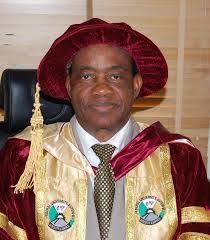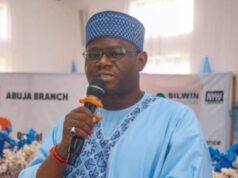 It was Dr. Philip Afaha, a senior lecturer at the Department of History and Diplomatic Studies, University of Abuja, who once said: “the Tiv people made me proud. They have shown that it is possible to create a culture and they did that in our generation. Instead of just abdicating their authority to any herbalist in the land, or off-springs of Colonial-imposed rogues, the Tiv created their Kingship. Not so long ago, they crafted the rules, deliberated and came up with the most educated traditional ruler in the world. Culture is not necessarily what we are compelled to do, far from it. It is also what we chose to do. In other kingdoms it is the most diabolic and feared person that is the king. The Tiv have made a statement; they don’t bow to fear, they would rather bow to knowledge. Long live the Tor Tiv.”
It was Dr. Philip Afaha, a senior lecturer at the Department of History and Diplomatic Studies, University of Abuja, who once said: “the Tiv people made me proud. They have shown that it is possible to create a culture and they did that in our generation. Instead of just abdicating their authority to any herbalist in the land, or off-springs of Colonial-imposed rogues, the Tiv created their Kingship. Not so long ago, they crafted the rules, deliberated and came up with the most educated traditional ruler in the world. Culture is not necessarily what we are compelled to do, far from it. It is also what we chose to do. In other kingdoms it is the most diabolic and feared person that is the king. The Tiv have made a statement; they don’t bow to fear, they would rather bow to knowledge. Long live the Tor Tiv.”
In the 70s, most students of northern origin seeking university admission applied to Ahmadu Bello University Zaria. It was the university established by the defunct northern region and naturally gave priority to applicants from the region.
A few of us from the north decided to differ. There was a university established in Ibadan, the capital city of the defunct western region. It was the first Nigerian university, established during the colonial era which also proudly advertised itself as the best. Each year, it carefully screened applicants for admission and selected the best students all over Nigeria to admit and matriculate. That was the university we applied to; that was the university that gave us admission. To Ibadan we went.
James Ortese Ayatse was one the few brilliant students from the north to matriculate as a student of the first and the best university in Nigeria in 1975. He was just one of us, the few northern students and even fewer Tiv students to matriculate in Ibadan that year. The next four years proved to be a wrenching ordeal as we struggled to obtain the celebrated meal ticket called a university degree.
We were all from very poor families. In fact without the government scholarship which covered our tuition, feeding, clothes and books – it never went above Five Hundred Naira per annum – many of us could not have survived the ordeal. As meager as the scholarship money was, some of us still used it to pay the school fees of our junior ones in secondary and primary schools.
To compound our problems, without a bridge across the Niger, the road to Ibadan then was winding. There were two routes; you went through Onitsha by one of the “buses” going to Lagos. What was called a bus then from Gboko to Lagos was actually a lorry – gongoro – built with the body looks of a bus. The sitting arrangement was terrible. Sometimes you sat with your back to where the bus was headed. The passengers were mostly lower rank soldiers, their wives, children and livestock – live chicken, goats and pigs. The stench in those contraptions cannot be described.
There was a second route. You could go through Shintaku, cross over to Lokoja and catch a taxi to Ibadan. There was no bridge in Lokoja at that time so we ended up crossing the confluence of rivers Benue and Niger at Lokoja by boat. On one of such trips, I almost got drowned with Joseph Akaanan, my friend and fellow student when our engine canoe malfunctioned and the boat almost capsized.
As if these problems were not enough, in our final year in 1978, General Olusegun Obasanjo decided to triple the cost of food on all university campuses. The students reacted with demonstrations and for the first time in Nigerian history, armed soldiers were unleashed on the campuses. They then proceeded to shoot and kill unarmed students abundantly from Lagos to Zaria. Most of us who survived it decided that if this was what getting a university education in Nigeria meant, we had seen enough of it.
One of the young Tiv lads who graduated from the University of Ibadan in 1979, James Ayatse had good reason to think differently from us. In the department of Biochemistry where he took a degree, he was the best graduating student. To him, the arcane world of the university was home.
Ayatse went ahead to obtain an MSc at the University of Calabar in 1982, where again he was the best graduating student that year. By then, he had caught the attention of the Commonwealth of Nations who gave him a scholarship to study at the University of Surrey, England for a Phd in Biochemistry.
Back to the University of Calabar, he became a Professor of Biochemistry in 1990 and added an MBA to it in 1992. His resume in the university system is most impressive. He was at different times the head, Department of Chemistry Benue State University, Makurdi, Director of Academic Planning, Benue State University and Member, Institute of Biology, Chartered Biologist, United Kingdom, as well as Institute of Medical Laboratory Science, United Kingdom and member, New York Academy of Science, USA.
He has capped it up all with the fact that he is the only Tiv man who has ever been appointed the Vice Chancellor of two Federal Universities – the Federal University of Agriculture Makurdi and Federal University of Technology Dutsima in Katsina State.
Those of us who took our first university degree with James Ayatse thought we had donated him permanently to the academic world. His seamless transition from the ivory tower to royalty makes us all very proud of him. May the reign of the new Begha u Tiv be very long. [myad]






